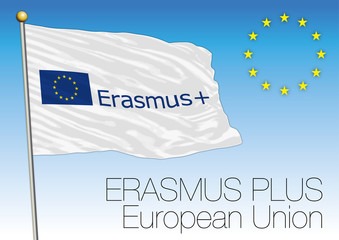Erasmus, the EU student cultural and educational exchange programme is celebrating its 30th anniversary in June this year. Since launching in 1987 with just 11 members, including the UK, Erasmus has expanded to 33 EU countries – plus more than 160 partner countries – and has represented an invaluable funding lifeline to some 9 million students.
But will UK students be joyously throwing their mortar boards into the air in two years time once England leaves Europe?
It’s a question that will be repeatedly marked up on classroom whiteboards as March 2019 approaches. In the meanwhile, of course, teachers and lecturers will carry on their vital work, and hosts of homestay accommodation, their crucial role too. Not just as providers of affordable rooms but cultural exchange ambassadors to students from all around the world.
Hosted accommodation scheme play its part
The UK is currently the second-most popular destination in the world for international students, according to Universities UK, June 2016. As a pivotal member of Erasmus, the UK was the third most popular destination overall for students volunteering, studying or training abroad. In 2014, the programme became Erasmus+ offering a key opportunity by extending its funding to apprentices, volunteers, staff and youth exchanges, and even jobseekers.
The hosted accommodation scheme was also able to play its part through the availability of affordable standard accommodation to those students receiving funding by Erasmus+, especially in the continuing aftermath of the 2008 financial crisis. As overall EU student numbers rose to 6 per cent in 2015/16 (Higher Education Statistics Agency – HESA), accommodation rentals skyrocketed in London and other university towns, such as Brighton, Cambridge and Manchester. Living costs for a student at a college in London had risen by more than 12 per cent to nearly £14,000, while for students outside of London, less than one sixth of their living costs is spent on food, according to the National Union of Students (NUS).
Since the June 2016 referendum, the House of Commons Education Select Committee has reported that the number of EU undergraduates had dropped by more than 7 per cent, and is “likely to continue amid Brexit uncertainty”. However, at the same time, Erasmus+ report that “2016 was the most popular year so far in the UK”, and due to a higher budget they expect an even greater take-up in 2017.
Consequently, this current year’s successful Erasmus+ applicants will be awarded funding for the full duration of their courses, and all others on the scheme should continue studying with their partners as usual through to completion. Erasmus also confirm that they remain “wholly committed to the programme and its benefits” and “strongly supports continued full membership of the programme for the UK through to 2020.”
In addition, the UK Government has confirmed that it will underwrite grant agreements for Erasmus+, which are signed while the UK is still a EU member, even if payments continue beyond the exit date. This means business as usual for 2018 application deadlines. Yet, it is still unclear whether the UK will continue its participation in the Erasmus scheme following Brexit.
International students content to carry on applying to study in UK
With still two years to go till Brexit day itself, it seems that student attitudes towards applying to the UK are less negative now than it was nine months after the referendum. Despite the drop-off in interest reported by the government, it seems a large proportion of international students are still content to carry on applying to study in the UK.
In a recent survey of more than 27,000 prospective international students, it was found that only 13 per cent said they were less interested in studying in the UK. Separate research also revealed that active promotional campaigns were successful in persuading nearly 9 in 10 of those surveyed that the UK was still a “welcoming” place for applying to study.
Another factor always present in any calculation when deciding where to study is the cost of accommodation. Recent figures show that rents are a third higher in London and the South East than in 2007, and the UK inflation rate, which is already hitting 2.7 per cent, is expected to continue, as will the rise in rented accommodation.
In the period leading up to Brexit and beyond, a hosted room will no doubt also continue to represent a “welcoming” and more affordable option for those Erasmus+ international students and others on short courses of up to a year.

